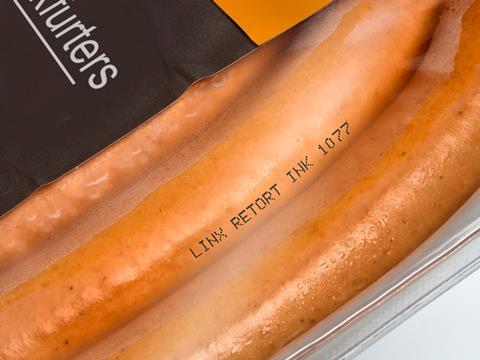
Linx Printing Technologies has introduced an ink specially formulated to resist moisture, colour change and transference.
The company argues that its new product is suited for consistent coding through pouch and can retort applications where the contents are cooked in the packaging after they are coded.
The new Linx Black retort ink 1077 was developed for the company’s Linx 8900 and 8800 Series continuous inkjet (CIJ) coders and is a dye-based MEK ink. This product is specifically designed for use in typical sterilisation and wet retort process conditions, and the company argues that its formulation enables printers to code through a thin layer of oily film or grease. In addition, it reportedly contains components that enhance its adhesion under moist and high-temperature conditions, delivering adhesion and transfer resistance, as well as durability and legibility on a range of materials after processing.
According to the company, typical applications for Linx Black retort ink 1077 include a variety of food packs, such as ready meals, vegetables, beans, fruit, soup, rice, meat and fish products and pet foods. This includes any products that are coded before a cooking process.
The ink is also reportedly suitable for use on many materials including metal cans, formed aluminium and plastic packaging such as polyester (PET) pouches.
“Our new Linx Black retort ink 1077 meets our customers’ increasing demands for an ink that resists colour change through the retort process,” says Simon Millett, Inks Product Manager at Linx. “This latest addition to our ink range improves the options available to our customers to ensure they can achieve consistently reliable and long-lasting codes, however challenging the application.”













